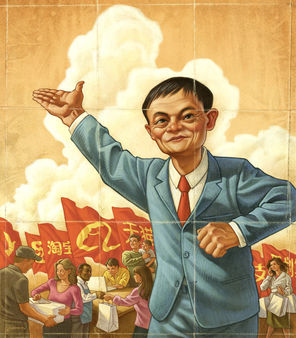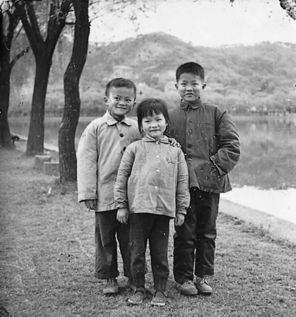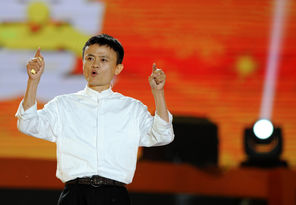Originally published September 14, 2014 at 8:01 PM | Page modified September 16, 2014 at 6:52 AM
Corrected version
Alibaba founder keeps tight rein on his company
China’s kingpin of e-commerce got his start working through a friend he made on a 1995 visit to Seattle.
The New York Times
GREG NEWBOLD / The New York Times
Jack Ma, the entrepreneur who built Alibaba, is a celebrity executive in China. He said he chose the company’s name because “everyone knows the story of Alibaba. He’s a young man who is willing to help others.”
Jack Ma, founder of Alibaba
Age: 49
Wealth: Alibaba’s pending IPO will make him worth more than $15 billion.
Seattle connection: His first company mailed business listings to a Seattle friend for posting on the Web.
Stake in Alibaba: 9 percent, the largest individual shareholder
Source: The New York Times
![]()
At the resplendent China World Hotel in Beijing, scores of cameras snapped as colorful confetti floated down from the ceiling. It was Aug. 11, 2005, and this was the global coming-out party for Alibaba, the Chinese e-commerce upstart. After months of frantic negotiations, U.S. Internet giant Yahoo had agreed to invest $1 billion in cash and create deeper business ties, in exchange for a 40 percent stake in Alibaba.
Alibaba’s founder, Jack Ma, thin, energetic and standing just over 5 feet tall, was beaming. It was his coming-out party too; the partnership would pave the way for Alibaba to become an international juggernaut.
For days, Ma was almost giddy about a deal that provided his company with a huge infusion of money and unfettered access to Yahoo’s search technology. But Ma soon started worrying that he had sold the stake too cheaply and given up too much control.
Trying to buy back most, if not all, of Alibaba’s shares, Ma started talks that dragged on for several years. With the relationship souring, Ma transferred ownership of Alibaba’s fast-growing online payment service, Alipay, to an entity that he controlled. He didn’t get the permission of Alibaba’s board. He just went ahead and did it.
While Yahoo complained, Ma seemed to get everything he wanted, eventually. In 2011, he negotiated an agreement giving him and a handful of key lieutenants a majority stake in Alipay, one of the company’s crown jewels. A year later, Ma secured a plan for Yahoo to reduce its stake in Alibaba.
With the Alibaba Group due to go public this week in an offering that could value the company at about $160 billion, investors will have little doubt about who is in control of the company. Ma, 49, is the public face. He is the chief negotiator. He is the top strategist. He is the biggest individual investor, with a 9 percent stake.
Alibaba, a company started out of Ma’s apartment in 1999, is now a technology colossus worth more than U.S. stalwarts like eBay and Hewlett-Packard.
That success has helped make Jack Ma a kind of celebrity CEO, an executive comfortable hobnobbing with business moguls in Davos, leading tours of his company for China’s political elite, and promoting the “Wisdom of Jack Ma” in books and on DVDs.
Ma regularly strikes deals with close friends and buys companies in seemingly unrelated industries. At times, it is hard to determine whether an investment is personal or professional because the boundaries between Ma’s portfolio and Alibaba’s holdings can blur.
Such activities are not always transparent, a potential red flag for new shareholders in a public company. Like many Chinese companies, Alibaba also operates behind a cloak of complicated ownership structures, which may limit dissenting shareholders’ objections.
Ma grew up in the eastern Chinese city of Hangzhou, the middle of three children born to a pair of performers of pingtan, a traditional musical storytelling technique.
At 10, Ma Yun, as he is known in Chinese, took a liking to English and would ride his bicycle to the Hangzhou Hotel to practice with foreign tourists, an experience he said opened his mind to the outside world.
After passing the national college entrance exam on the third try, Ma gained admission to a local teachers’ college, where he excelled and was elected president of the student union. When he graduated in 1988, he took a $14-a-month job teaching English at the Hangzhou Institute of Electronic Engineering and quickly became one of its most popular instructors.
With China’s economy beginning to take flight, Ma saw opportunity in entrepreneurship. In his spare time, friends say, he co-founded a translation agency, sold medicine and dabbled in stocks. “If I’m not a millionaire by the time I’m 35,” he joked with his friend Qi Xiaoning, “please kill me!”
He visited the United States for the first time in 1995. Ma had befriended Bill Aho, an American who taught English in Hangzhou, and he stayed with Aho’s relatives in Seattle. There, he was introduced to the World Wide Web by Aho’s son-in-law, Stuart Trusty, who ran one of America’s first Internet service providers, VBN.
“At that time, I had an office in the U.S. Bank tower, and Jack came and I showed him what the Internet was,” Trusty says. “Back then, the Internet was largely a directory for governments and businesses, but he seemed excited.”
Ma returned home and set up one of the country’s first Web companies, China Pages, an online directory for domestic businesses looking for customers overseas. Former colleagues say Ma worked tirelessly to collect information and translate it into English. When done, he mailed the listings to VBN in Seattle to post on the Web.
Then Ma lost control of his company. In 1996, China Pages was pressured into forming a joint venture with Hangzhou Telecom.
Ma started Alibaba on Feb. 21, 1999, with backing from 17 friends. He picked the name, he later explained, because “everyone knows the story of Alibaba. He’s a young man who is willing to help others.”
The company was built on a similar premise: to help businesses find overseas customers.
Early on, Shirley Lin, a Goldman Sachs banker, visited the makeshift headquarters. She had heard about the company from a friend, Joseph Tsai, a Yale-educated former lawyer who had recently joined Alibaba.
“I went up to the apartment, where they were all working 24/7,” says Lin, who now teaches at the Chinese University of Hong Kong. “Jack’s ideas were not entirely original — they had been tried in other countries. But he was completely dedicated to making them work in China.”
A month later, Goldman led a $5 million investment in the company. Soon after, Masayoshi Son, the chairman of Japan’s SoftBank and one of the world’s richest men, agreed to lead a second round of financing worth $20 million.
But power was still largely concentrated in Ma’s hands. He and his top deputy, Tsai, held two of the company’s four board seats. Ma also controlled the underlying companies that Alibaba used to operate in China.
Around the same time, Ma started aggressively making deals with a small circle of businessmen with whom he socialized. Known as the Zhejiang Gang because many of the members grew up in Zhejiang province, they have worked on a web of interconnected deals, both for personal benefit and for corporate profit.
To help quell any government opposition, friends say, Ma has also increasingly cultivated ties to Beijing.
When Alibaba goes public this week, investors can decide whether Ma’s tight grip is a selling point or a stumbling block.
Information in this article, originally published Sept. 14, 2014, was corrected Sept. 15, 2014. A previous version of a box that ran with this story incorrectly stated that the pending IPO would make Alibaba founder Jack Ma worth more than $15 million. In fact, the correct amount is more than $15 billion. .
 Four weeks for 99 cents of unlimited digital access to The Seattle Times. Try it now!
Four weeks for 99 cents of unlimited digital access to The Seattle Times. Try it now!


















